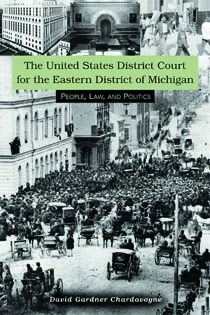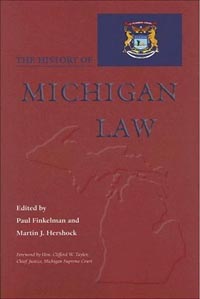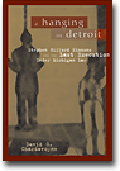
The Northwest Ordinance and Michigan's Territorial Heritage
A Hanging in Detroit
Professor David Chardavoyne is a lawyer, teacher, and author who has written extensively on the legal history of Michigan's early years. After twenty-one years as a practicing attorney, David Chardavoyne went on to pursue his love of history and of teaching at both Wayne State University Law School and the University of Detroit-Mercy School of Law. Professor Chardavoyne was the principal speaker at the bicentennial celebration of the Michigan Supreme Court in October 2005 addressing the first decade of the early Michigan court.

In The United States District Court for the Eastern District of Michigan: People, Law, and Politics, David Chardavoyne chronicles the history of the federal trial court based in Detroit with jurisdiction covering the eastern half of the State of Michigan. His account spans 175 years from the court's establishment in 1837 and describes the court's judges, its litigants, the major cases it has decided, and the people who have been affected by the court's decisions. With fifteen district judges and a further twelve senior U.S. district judges and U.S. magistrate judges, the United States District Court for the Eastern District of Michigan conducts court today in five federal courthouses located in Detroit, Bay City, Flint, Port Huron, and Ann Arbor, Michigan.
Chardavoyne presents the court's history in chronological order, divided into five parts. Each period is characterized by the people and the events that shaped the development of the state from its early days on the frontier through to the present metropolitan era. The issues faced by the court have often been part of the national agenda, from fugitive slave laws to civil rights and freedom of speech. This history examines how conflicting interests have influenced a wide range of issues before the court, involving both the resolution of cases and for deciding how the court is organized. This comprehensive history includes extensive appendixes that detail the succession of judges since the court's inception, a list of court case filings through the year 2010, and a list of all court officials.

Following the Michigan Supreme Court's bicentennial commemoration in 2005, The History of Michigan Law was published to offer the first comprehensive study of the development of law in the state of Michigan. Michigan was among the first states to admit African-Americans and women to its law schools and was the first governmental entity to abolish the death penalty. Michigan, unlike its midwestern neighbors, did not enact racial exclusion laws in the post-Civil War era. Michigan has also played a leading role in developing modern rape laws, in protecting the environment, and in assuring the right to counsel for those accused of crimes.
David Chardavoyne contributed a chapter to The History of Michigan Law, entitled The Northwest Ordinance and Michigan's Territorial Heritage. This book represents a serious survey of Michigan's rich legal past and will appeal to scholars and students of American history.
Although there has been much controversy about the continued use of capital punishment in the United States, few know that in 1847 the US State of Michigan was the first English-speaking jurisdiction, and one of the first in the world, to abolish capital punishment. The prohibition of capital punishment is now part of the Michigan state constitution.

David Chardavoyne's book, A Hanging in Detroit, is a vivid account of the last execution that was carried out under Michigan law in 1830. Chardavoyne evokes all of the events revolving around the crime, the trial, and execution that eventually that led to the passage of the state law barring capital punishment. His account describes the social and legal customs of the times, together with the characters involved in the drama, and the controversy arising from the affair.
This book offers an engaging story about an important facet in Michigan's legal history. It is the first account to examine in detail the facts surrounding the events of this case and chronicles the public response to the execution.
A Hanging in Detroit was named a Michigan Notable Book of 2004 by the Library of Michigan Foundation. The publisher, Wayne State University Press, also offers the following reviews:
"This benchmark study of the early law-in-court history of Michigan is a must-read for all sides on the question of restoring capital punishment in the state." -Avern Cohn, District Judge, United States District Court
"Chardavoyne has created a very readable book on an obscure yet important event in Michigan history. Solid research and a straightforward writing style that is free of a lot of legal jargon successfully debates the issue of capital punishment in the nineteenth century." -David Lee Poremba, Manager of the Burton Historical Collection and editor of Detroit in Its World Setting.




